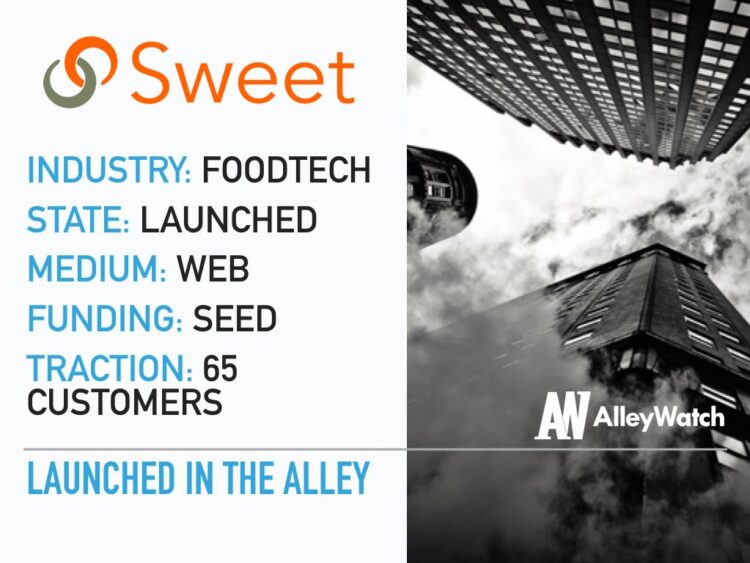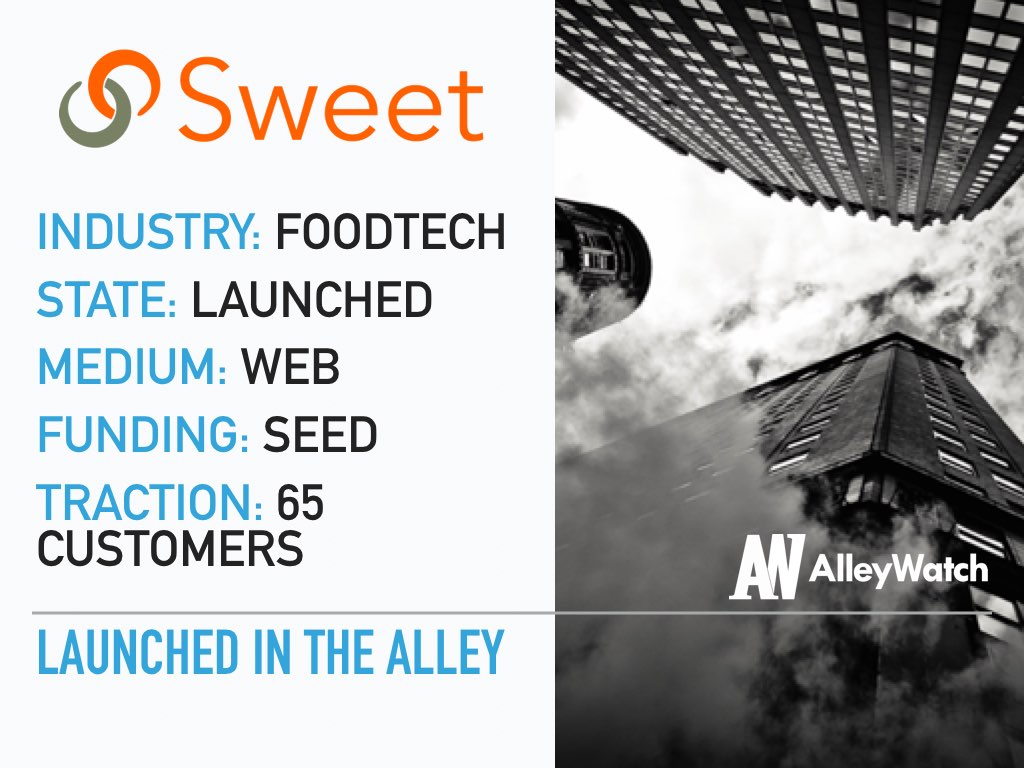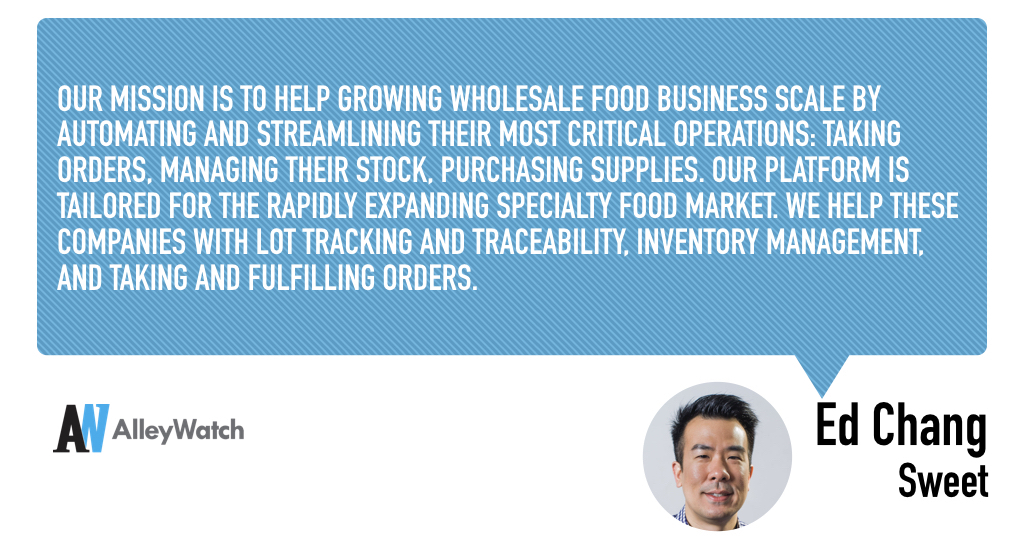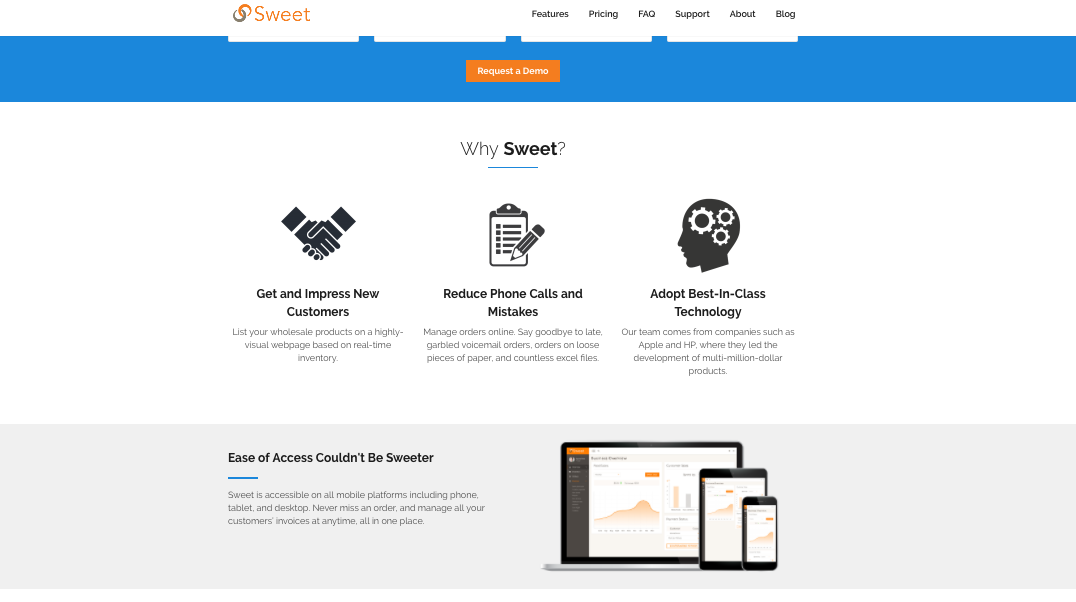The supply chain to get food from producer to table is a long, complex one. One of the most critical participants in the chain is the wholesaler. The process of taking orders, managing stock, and purchasing supplies is reliant on tools that were developed 30 years ago. Sweet has built a platform to manage the entire wholesale food supply chain complete with inventory management. The company’s software seamlessly integrates all inventory information through one system saving repetitive tasks, phone calls and other needless, time consuming tasks.
AlleyWatch chatted with CEO Ed Chang about the company and where the company is headed.
Tell us about the product or service.
The wholesale food supply chain is largely built on technology from the early 2000’s. Windows XP-like applications, paper invoices, tons of phone calls to confirm orders, and orders / inventory numbers jotted down haphazardly onto notepads.
Sweet is solving that. Our intelligent inventory management platform automates and streamlines managing orders and inventory for small-medium-enterprise brands, distributors, and retailers. Our initial focus is on the food industry, where traceability to the origin is increasingly important, and a tremendous rise in organic, local, and allergen-sensitive foods are driving a sea change in the food market: giving rise to thousands of new and emerging food companies annually.
How is it different?
Our mission is to help growing wholesale food businesses scale by automating and streamlining their most critical operations: taking orders, managing their stock, purchasing supplies. Our platform is tailored for the rapidly expanding specialty food market. We help these companies with lot tracking and traceability, inventory management, and taking and fulfilling orders. We’re also really passionate about building a food business community in NYC, so that we can help food businesses expand their network, get peer support and discover more business opportunities.
What market are you attacking and how big is it?
Our “Sweet” spot is the SME food business market. This market is composed of growing food producers, distributors, and retailers. In the U.S., this market is composed of nearly 3 million companies, who together generate $ 9.5 billion in annual sales.
What is the business model?
We charge on a monthly subscription-basis, with an average tier price of roughly $50/month for two users, and $20-$30 for each additional user, depending on the plan.
What inspired the business?
My initial foray into startups was Sweetist, a food delivery startup I started after jumping through hoops to get a cake delivered, from our favorite bakery, to a restaurant where I was surprising my wife for her birthday. It took so many steps that I knew there had to be a better way. Then, through operation of Sweetist and our close working partnership with a number of bakeries who also sold wholesale, we came to understand the antiquated nature of selling and distributing wholesale food and the opportunity to solve even bigger problems with Sweet.
Can you give us some use cases where use of your technology has been a game changer for a client?
In a number of cases, our customers were entering literally the same data into 3 different systems, i.e., their accounting platform, their shipping platform, and their production spreadsheets. We automate that so that when a wholesale vendor using Sweet enters an order in, the order is transmitted directly to their accounting platform, shipping platform, and then production and packing lists are automatically generated. For one customer, Sweet saved them 5 hours a week and gave him the ability to spend more time focusing on growing the business.
What are the milestones that you plan to achieve within six months?
For the next six months, our goal at Sweet is to acquire 50 new users and roll out a workshop series focused on advice and networking sessions for new/up and coming food businesses, to further help our customers.
What is the one piece of startup advice that you never got?
Concrete advice on networking. Some advisors say you shouldn’t waste your time networking. Others say it’s helpful. My personal take is that founders should only spend significant time on it if they have a specific (and important) goal in mind.
If you could be put in touch with anyone in the New York community who would it be and why?
Dennis Mortensen, CEO & Founder of x.ai. These days, A.I. has to be part of your strategy, no matter what kind of startup you build. I’d be interested in gleaning some insights into how to best leverage A.I. into our platform and strategy.
Why did you launch in New York?
The food scene in New York City is rivaled only by cities like Paris, Tokyo, and just a few others. One result of that is there are more independent restaurants, food makers, and food distributors here than in most other cities. That makes it easier to find customers – up-and-coming food companies who are open to partnering with a like-minded tech startup.
Where is your favorite bar in the city for an after work drink?
Calexico. Great drinks and the Texan in me can accept their Tex-Mex.






